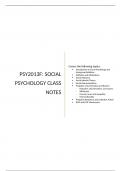Covers the following topics:
Introduction to Social Psychology and
PSY2013F: SOCIAL
Intergroup Relations
Attitudes and Attributions
Social Influence
Social Identity Theory
PSYCHOLOGY CLASS
Social Representations
Prejudice, Discrimination and Racism
- Prejudice, discrimination, and racism
NOTES - Whiteness
- Poverty, land, and inequality
- Intersectionality
Prejudice Reduction and Collective Action
RMF and FMF Movements
, PSY2013F Social and Developmental Psychology:
Lecture 1:
Introduction and overview: Social Psychology:
Social Psychology is taught in the first half of the course. – by Simone
The social psychology module introduces students to some basic concepts and
theories in social psychology – e.g. Attitudes and attributions, intergroup theories.
Exposes students to current research within the field- social psych still a new field
Provides an opportunity for students to engage critically with existing theories and
their relevance to the (South) African context
Learning Outcomes:
Students who complete this module should be able to:
Explain individual and group behaviour using social psychology theories and
concepts,
Provide a critical analysis of social psychology research and theory, and
Engage in critical debates on socio-political issues in South Africa, particularly
those that deal with issues of identity.
Topics covered include:
Race and racism; prejudice and discrimination; social identity; social
influence; social representations; social change etc. – this week is the history
of sp. And how we define it as well as attitudes and attributions.
Intro to Social Psychology:
Has its roots in Psychology and Sociology.
- begins in 1908 with first 2 official textbooks – written by both sociologist and
psychologist – e ross and magdogle
Studies a wide range of topics and influenced by a number of disciplines – law,
economics, political science
Three orientations:
Individual
- Emerges from the USA, positivistic and favours experimental research
- Main focus is individual because it originates in USA – which is a very individual
society- favourable of positivistic research – laboratory, experiments, objective,
claims that can be proven
, - Critique: European psych says okay but where is the social? What about the society
that the individual finds themselves in? How does this effect the individual?
Social
- Emerges in Europe, focuses on social aspect of society.
Political
- Emerges from low-income countries, focuses on issues related to oppression.
- How do issues of oppression and inequality affect the individual and their decisions
and attitudes
Changes in definitions reveal its contested and changing nature.
Defining the field:
A field of study that focuses on the manner in which the behaviour, feelings, thoughts
of one individual are influenced and determined by the behaviour and/or
characteristics of others [Baron & Byrne, 1981]
The scientific field that seeks to understand the nature and causes of individual
behaviour and thought in social situations [Baron & Byrne, 1997, p. 6]
The scientific study of the experience and behaviour of the individual in relation to
social stimulus situations [Sherif & Sherif, 1969, p. 8]
The study of how human behaviour is influenced by the presence, behaviour, and
products of other human beings [McGrath, 1970, p. 1]
An attempt to understand and explain how the thoughts, feelings, and behaviour of
individuals are influenced by the actual, imagined, or implied presence of others
[Allport, 1968]
Definitions are not neutral, and are often contested
- Shifts reflect debates within each discipline e.g. from individual to the social
- The discipline is transformed across national and other contextual boundaries
A psychology of a society
- Any psychology must be a psychology of a society, it must be concerned with
specific contexts, contexts inhabited by real living people, people inhabiting
bodies, living in specific communities, with particular histories [Ratele, 2003, p. 13]
– we cannot as a SA nation keep importing theories because the west has very
different ways of interacting- we have different social issues – theories from the
west become very irrelevant
Such a psychology must be relevant to the people and contexts it is concerned with –
in SA our focus is on intergroup relations
Our focus is on intergroup relations within the South African context
, Discussion:
Does the definition of social psychology discussed today match what you
understood/knew about the field?
Lecture 2:
Intergroup Relations:
In our context – this was being focused on
The domination of intergroup relations in psychology
In SA, the history of Psychology and intergroup relations has focused mainly on race
– even though relations are not only focused on race, could be class, gender, religion
etc., – but in SA because of Apartheid – we focused on race – because of how
attitudes were formed, how laws were formed, ect
In SA to create better environments for people- we need to be focusing on
intergroup relations in terms of race
A social psychology emerging predominantly from European and American scholars –
there was a disconnect between what we were importing and what the SA context
was saying.
A shift among SA psychologists towards the needs of the South African society and
the context – SP were arguing for a more contextualized and relevant SP for SA.
A more localized and relevant social psychology that responds to the needs of
the people
Mental testing:
Early social psychology that we see:
- First psychological research carried out on intergroup relations in SA.
The adaptation of tests for use on South Africans – tests adapted for SA context
The testing of the intellectual ability of population groups in SA
2 main tests:
1. The official mental hygiene scale – 1926 - the Fick test – concluding that black
children were intellectually inferior to white children.
2. The South African group test of intelligence – will cox in 1931
For the first time SA, psychologists are able to use a psychological method that is unique to
address SA context – first psychological research carried out on intergroup relations in SA –
tests were used to make legitimate claims about different racial groups- tests would be
given to white, black and Indian children (we are still under colonial/ apartheid rule) and




